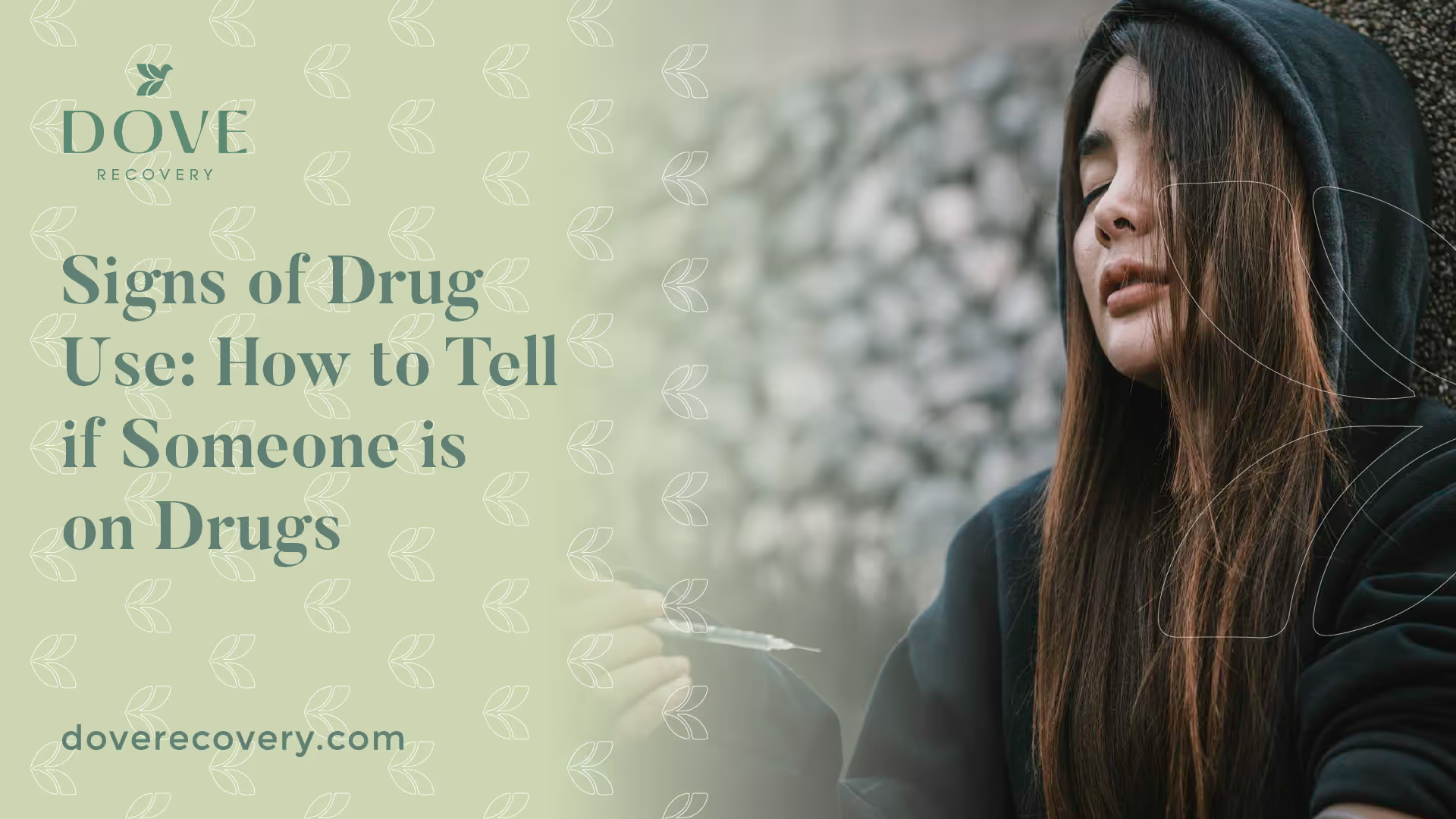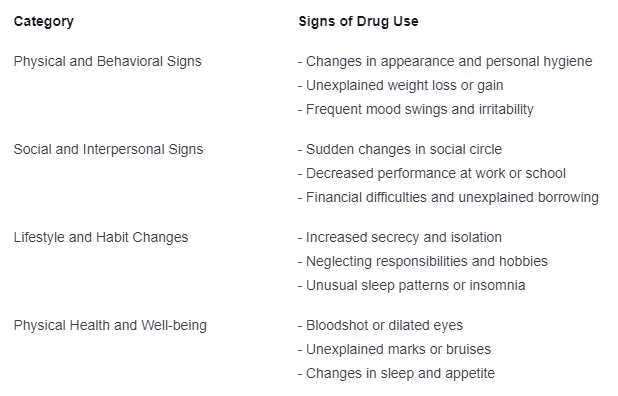Signs of Drug Use: How to Tell if Someone is on Drugs

Signs of Drug Use: How to Tell if Someone is on Drugs
Recognizing the signs of drug use is crucial in identifying and addressing potential substance abuse issues. Understanding the importance of recognizing drug use and being aware of the common signs and clues can help you provide support and assistance to someone who may be struggling with drug addiction.

Understanding the Importance of Recognizing Drug Use
Recognizing drug use is essential for several reasons. Firstly, early detection allows for early intervention and increases the chances of successful treatment and recovery. Identifying the signs of drug use can also help prevent further harm to the individual's physical and mental health, as well as their relationships and overall well-being.
Furthermore, recognizing drug use enables you to offer support and encouragement to seek professional help. By expressing your concern and providing a non-judgmental environment, you can play a vital role in guiding someone towards the necessary resources and treatment options available. It's important to approach the situation with empathy and understanding, as drug addiction is a complex issue that requires sensitive handling.
Common Signs and Clues of Drug Use
While the signs of drug use can vary depending on the drug being used and the individual's specific circumstances, there are several common indicators to be aware of. These signs can manifest physically, behaviorally, socially, and in various lifestyle changes.

It's important to note that these signs should be considered collectively and in the context of the individual's overall behavior and well-being. No single sign is definitive proof of drug use, but when multiple signs are present, it may indicate a deeper issue.
If you suspect someone may be using drugs, it is crucial to approach the situation with care and concern. Open communication, seeking professional help, and providing support are pivotal steps in helping individuals overcome drug addiction.
Physical and Behavioral Signs
Recognizing the signs of drug use is crucial in identifying if someone is struggling with substance abuse. By paying attention to physical and behavioral changes, you can begin to understand if someone may be using drugs. Here are some key indicators to look out for:
Changes in Appearance and Personal Hygiene
One of the telltale signs of drug use is a noticeable change in appearance and personal hygiene. Individuals who are using drugs may neglect their physical appearance, appearing disheveled or unkempt. They may lose interest in grooming habits that were once important to them, such as showering regularly or taking care of their hair and skin.
Unexplained Weight Loss or Gain
Fluctuations in weight can also be a sign of drug use. Some substances can suppress appetite, leading to significant weight loss. On the other hand, certain drugs may cause weight gain due to increased cravings or changes in metabolism. If someone experiences rapid and unexplained weight changes without a clear medical reason, it may be worth considering drug use as a potential factor.
Frequent Mood Swings and Irritability
Drug use can have a profound impact on an individual's mood and behavior. If you notice someone exhibiting frequent mood swings or unexplained irritability, it could be a sign of drug use. Drugs can disrupt the brain's natural chemistry, leading to extreme highs and lows in mood. Keep in mind that mood swings can also be caused by other factors, so it's important to look for other signs and patterns of behavior before making any conclusions.
Understanding these physical and behavioral signs is just the first step in recognizing drug use. It's important to approach the situation with care and concern, seeking professional help and support when necessary.
Social and Interpersonal Signs
When trying to determine if someone is using drugs, it's important to consider social and interpersonal signs that may indicate drug use. These signs can provide valuable insights into changes in a person's behavior and relationships. Here are some key indicators to look out for:
Sudden Changes in Social Circle
One of the noticeable signs of drug use is a sudden change in social circle. Individuals who are using drugs may start associating with a new group of friends who are also involved in drug use. They may prioritize spending time with these new acquaintances, often neglecting their existing relationships.
If you observe that a person has distanced themselves from long-time friends and family members, and has started spending time with individuals who exhibit signs of drug use, it could be an indication of their involvement with drugs. However, it's important to approach the situation with care and avoid making assumptions without concrete evidence.
Decreased Performance at Work or School
Drug use can significantly impact a person's performance at work or school. Individuals who are using drugs may experience difficulty concentrating, lack of motivation, and a decline in productivity. Their attendance and punctuality may also be affected.
If you notice a significant and unexplained decrease in a person's performance, it may be worth considering the possibility of drug use. However, it's important to remember that other factors, such as personal issues or health problems, can also contribute to decreased performance. Therefore, it's crucial to approach the situation with empathy and gather more information before drawing conclusions.
Financial Difficulties and Unexplained Borrowing
Drug use can be financially burdensome. Individuals who are using drugs may experience financial difficulties as their drug habit becomes increasingly expensive. They may struggle to manage their finances, resulting in unpaid bills, borrowing money from friends or family members, or even resorting to theft to support their drug use.
If you notice someone consistently borrowing money without a valid explanation or if their financial situation seems to have deteriorated rapidly, it could be a red flag for drug use. However, it's important to approach the situation tactfully, focusing on providing support rather than judgment.
Recognizing social and interpersonal signs of drug use is just one piece of the puzzle. If you suspect someone may be using drugs, it's crucial to approach the situation with care and concern. Engaging in open and non-judgmental communication, seeking professional help, and encouraging treatment and recovery can make a significant difference in supporting individuals who may be struggling with drug use.
Lifestyle and Habit Changes
Recognizing signs of drug use involves paying attention to various aspects of a person's life, including their lifestyle and habits. Changes in these areas can provide valuable clues to determine if someone is using drugs. Here are some key indicators to look out for:
Increased Secrecy and Isolation
One of the telltale signs of drug use is an increase in secrecy and isolation. Individuals who are using drugs may become secretive about their activities, whereabouts, and the people they associate with. They may withdraw from social engagements, avoid family and friends, and exhibit a desire for privacy.
If you notice someone becoming unusually guarded about their personal life or exhibiting a heightened need for privacy, it could be an indication that they are involved in drug use.
Neglecting Responsibilities and Hobbies
Drug use often leads to a decline in a person's ability to fulfill their responsibilities and maintain their usual hobbies. Someone who is using drugs may neglect obligations at work, school, or home. They may experience a decline in their performance, frequent absences, or decreased motivation to fulfill their usual responsibilities.
Furthermore, individuals may lose interest in activities they once enjoyed. Hobbies, sports, and social engagements that were once a significant part of their life may take a backseat or become entirely abandoned.
Unusual Sleep Patterns or Insomnia
Changes in sleep patterns are another red flag that may indicate drug use. Someone who is using drugs may experience disrupted sleep, insomnia, or other irregularities in their sleep-wake cycle. Drug use can interfere with the body's natural sleep rhythms, leading to difficulties in falling asleep or staying asleep.
Keep an eye out for signs of excessive fatigue during the day or a noticeable increase in energy during odd hours. These irregular sleep patterns can be linked to drug use and may be accompanied by other physical and behavioral signs.
By understanding these lifestyle and habit changes, you can be more aware of the potential signs of drug use. It's important to approach the situation with care and concern, as drug use can have serious consequences. If you suspect someone may be using drugs, consider seeking professional help and support.
Physical Health and Well-being
When trying to determine if someone is using drugs, it's important to pay attention to their physical health and well-being. Certain physical signs can provide clues about potential drug use. Here are some key indicators to look out for:
Bloodshot or Dilated Eyes
One common physical sign of drug use is bloodshot or dilated eyes. Drugs can affect the blood vessels in the eyes, causing them to appear red and bloodshot. On the other hand, some drugs can cause pupils to become unusually large and dilated. These changes in eye appearance can be observed even in different lighting conditions.

Unexplained Marks or Bruises
Another potential sign of drug use is the presence of unexplained marks or bruises on the body. These marks can result from injecting drugs intravenously or from self-inflicted harm due to drug-induced compulsive behaviors. It's important to note that the presence of marks or bruises alone does not definitively indicate drug use, as other factors may also contribute to their occurrence.
Changes in Sleep and Appetite
Drug use can often disrupt normal sleep patterns and appetite. Changes in sleep and appetite can be indicative of drug use, but it's important to consider other factors that could also contribute to these changes, such as stress or underlying medical conditions. Here are some common sleep and appetite patterns associated with drug use:
Sleep Patterns:
- Insomnia or difficulty falling asleep
- Excessive sleepiness or oversleeping
- Irregular sleep patterns
Appetite:
- Loss of appetite resulting in weight loss
- Increased appetite leading to weight gain
- Erratic eating patterns
It's important to approach the situation with care and concern when suspecting drug use in someone. It's crucial to remember that these physical signs alone do not confirm drug use, but they can serve as potential indicators. If you believe someone may be using drugs, it's essential to seek professional help and support to address the situation appropriately.
Approaching the Situation
Discovering that someone you know may be using drugs can be a difficult and sensitive situation. It's important to approach the situation with care, concern, and a desire to help. Here are some steps to consider when approaching someone you suspect might be using drugs.
Communicating with Care and Concern
When discussing your concerns with someone who may be using drugs, it's crucial to approach the conversation with empathy and compassion. Choose a private and comfortable setting where both of you can feel at ease. Start by expressing your genuine concern for their well-being and let them know that you're there to support them.
Avoid being confrontational or judgmental, as this may cause the person to become defensive or shut down. Instead, use active listening skills and ask open-ended questions to encourage them to share their thoughts and feelings. By creating a safe and non-judgmental space, you increase the chances of the person opening up about their situation.
Seeking Professional Help and Support
While you may want to help the person on your own, it's important to recognize that drug use can be a complex issue that requires professional intervention. Encourage the individual to seek help from healthcare professionals, addiction counselors, or therapists who specialize in substance abuse.
You can provide them with information on local resources, such as treatment centers or support groups, and offer to assist them in finding the appropriate help. If you believe immediate medical attention is necessary, don't hesitate to contact emergency services. Remember, professional help and support are essential for addressing drug use effectively and promoting recovery.
Encouraging Treatment and Recovery
Recovery from drug use is a challenging journey, and the decision to seek treatment ultimately rests with the individual. However, you can play a supportive role by encouraging them to consider treatment options and highlighting the potential benefits of recovery.
Discuss the positive changes that can come from seeking treatment, such as improved physical and mental health, stronger relationships, and a brighter future. Remind them that they are not alone and that there are resources available to help them navigate the recovery process.
It's important to recognize that recovery is a personal choice, and the individual may not be ready to seek treatment immediately. Be patient, continue offering your support, and let them know that you are there for them whenever they are ready to take that step.
Remember, it's important to prioritize your own well-being throughout this process. Supporting someone who is using drugs can be emotionally challenging, so consider seeking support for yourself as well. Together, with professional help and a supportive network, you can assist in the journey towards recovery.
Conclusion
If you suspect someone may be using drugs, it's important to keep in mind that drug use can have serious consequences and can be emotionally challenging for both the individual and those around them. It's essential to approach the situation with care and concern, focusing on providing support rather than judgment. By recognizing the signs of drug use and taking steps to address the situation, you can make a significant difference in helping individuals who may be struggling with drug use.
Remember, professional help and support are essential for addressing drug use effectively and promoting recovery.
Sources:
- https://americanaddictioncenters.org/adult-addiction-treatment-programs/know-is-someone-on-drugs
- https://www.tn.gov/behavioral-health/substance-abuse-services/treatment---recovery/treatment---recovery/prescription-for-success/warning-signs-of-drug-abuse.html
- https://drugabuse.com/symptoms-signs-drug-abuse-effects/
- https://www.webmd.com/mental-health/addiction/signs-of-drug-addiction
